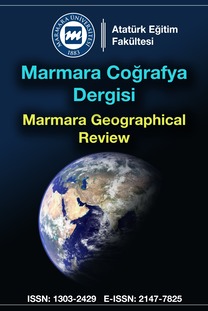2005 İLKÖĞRETİM PROGRAMINDA ÇEVRE EĞİTİMİ
Bu çalışmada, 2005 ilköğretim programındaki çevre eğitimi üzerinde durulmaya çalışılmıştır. Bu amaçla, ilköğretim kapsamındaki derslerin programları incelenmiş; kazanım, beceri, doğrudan verilecek değer gibi unsurlar kapsamında çevre eğitimine hangi derste ne kadar ve ne şekilde yer verildiği tespit edilmeye çalışılmıştır. Çalışma, nitel araştırma prosedürüne uygun bir şekilde ve doküman analizi tekniği kullanılarak yürütülmüştür. Araştırma bulgularına göre, 2005 ilköğretim programında; Fen Bilgisi, Hayat Bilgisi ve Türkçe dersleri programlarında çevre eğitimine en çok yer veren derslerdir. Fen Bilgisi dersinde çevre eğitimine biyolojik ve nedensel bir bakış açısı getirilirken; Hayat Bilgisi ve Türkçe derslerinde duyuşsal alana ağırlık verildiği tespit edilmiştir.
Environmental Education in 2005 Primary Education Curriculum
In this study, the importance on the environment education is attempted to be dealt with. To this end, the programs of the courses within the scope of the primary education were reviewed; and it was attempted to determine how much and in which manner the environment education are given in any of the courses based on the factors including gains, skills, direct values. The study was conducted as per the qualitative research procedure and by using document analysis technique. According to findings of the research, in the primary education program of year 2005, it may be stated Science, Social Studies, and Turkish courses include the environment education most in the primary education program of 2005. It was found out that, in Science course, environment education gains biologic and causal perspective and Social Studies and Turkish put more emphasis on affective area.
___
Ajiboye, j. O. ve Olatundun, S. A. (2010). Impact of Some Environmental Education Outdoor Activities on Nigerian Primary School Pupils’ Environmental Knowledge. Applied Environmental Education & Communication. 9(3), 149-158.Aksoy, B. (2003). Problem çözme yönteminin çevre eğitimine uygulanması. Pamukkale Üniversitesi Eğitim Fakültesi Dergisi. 2 (14), 83-98.
Alım, M. (2006). Avrupa Birliği üyelik sürecinde Türkiye’de çevre ve çevre eğitimi. Kastamonu eğitim dergisi. 14 (2). 599-616.
Armağan, F. (2006). İlköğretim 7. ve 8. Sınıf öğrencilerinin çevre eğitimi ile ilgili bilgi düzeyleri. Yayınlanmamış yüksek lisans tezi. Gazi üniversitesi eğitim bilimleri enstitüsü.
Aydemir, A. (2007). The investigation of teachers with to knowledge level on environmental concepts. Yayınlanmamış yüksek lisans tezi. Orta doğu üniversitesi.
Aydın, B. (2007). İlköğretim çocuğunun gelişim özellikleri. Ayla Oktay (ed.) ilköğretim çağına genel bir bakış içinde. 13-27. İstanbul: Morpa yayınları.
Barraza, L. ve Cuaron, A. (2010). How values in education affect children's environmental knowledge. Journal of Biological Education. 39(1), 18-23.
Bonnett, M. ve Williams, J. (2006). Environmental Education and Primary Children's Attitudes towards Nature and the Environment. Cambridge Journal of Education. 28(2), 159- 174.
Bozkurt,O., Akın, B. ve Uşak, M. (2004). İlköğretim 6. 7.ve 8. Sınıf öğrencilerinin erozyon hakkındaki ön bilgilerinin ve kavram yanılgılarının tespiti. Gazi üniversitesi Kırşehir eğitim fakültesi dergisi. 5(2), 277-285.
Burnard, P. (1991). A method of analysing interview transcripts in qualitative research. Nurse education today. 11(6). 461-466.
Chapman, D. J. (2011). Environmental Education and the Politics of Curriculum: A National Case Study. The Journal of Environmental Education. 42(3), 193-202.
Cutter, A. ve Smith, R. (2001). Gauging primary school teachers’ enviromental literacy: An issue of priority. Asia Pacific Education Review. 2(2). 45-60.
Darçin, E. ve Hamalosmanoğlu, M. (2006). Misconceptions about Greenhouse Effect. Internatinal Journal of Environmental and Science Education. 1(2), 104–115.
Eames, C., Cowie, B. ve Bolstad, R. (2008). An evaluation of characteristics of environmental education practice in New Zealand schools. Environmental Education Research. 14(1), 35-51.
Ergezen, S. (2007). İlköğretimde çevre eğitimi. Ayla Oktay (Ed.) Alan öğretimi içinde. 269-277. İstanbul: Morpa yayınları.
Ertürk, S. (1979). Eğitimde program geliştirme. Ankara: Meteksan.
Flogatis, E. ve Alexopoulos, I. (1991). Environmental Education in Greece. European Journal of Education. 26(4). 339-345.
Harris, C. (1991). Environmental education in England and Wales: A brief review. European Journal of Education. 26 (4). 287- 290.
İlgaz, R. (2007). The role and importance of extended educatıon in envıronmental educatıon. Ondokuz Mayıs Üniversitesi Eğitim Fakültesi Dergisi. 23, 38-50.
Littledeyke, M. (1997). Science education for environmental education? Primary teacher perspectives and practices. British Educational Research Journal. 23(5). 641-659.
Oliva, P. (2001). Developing the curriculum. New York: Longman.
Patton, M. (1990). Qualitative evaluation and research methods. Sage Publications: London.
Sagy, G. ve Tal, A. (2015). Greening the curriculum: Current trends in environmental education in Israel’s public schools. Israel studies. 20(1). 57-85.
Shaw, J. S. (2003). Enviromental education. Society. 41(1), 60-66.
Shobeiri, S. M., Meiboudi, H. ve Ahmadi, F. (2014). The brief history of environmental education and its changes from 1972 to present in Iran. International Research in Geographical and Environmental Education. 23(3), 228-241.
Stanisic, J. ve Maksic, S. (2014). Environmental education in Serbian primary schools: Challenges and changes in curriculum, pedagogy, and teacher training. The Journal of Environmental Education. 45(2), 118–131.
Ünal, S. ve Dımışkı, E. (1999). Unesco-Unep himayesinde çevre eğitiminin gelişimi ve Türkiye’de ortaöğretimde çevre eğitimi. Hacettepe Üniversitesi Eğitim Fakültesi Dergisi. 16(17), 142–154.
Yıldırım, A. ve Şimşek, H. (2006). Sosyal bilimlerde araştırma yöntemleri. Seçkin yayınları: Ankara
- ISSN: 1303-2429
- Yayın Aralığı: Yılda 2 Sayı
- Başlangıç: 1997
- Yayıncı: Marmara Üniversitesi
Sayıdaki Diğer Makaleler
2005 İLKÖĞRETİM PROGRAMINDA ÇEVRE EĞİTİMİ
HAMZA AKENGİN, ZAFER İBRAHİMOĞLU
İSTANBUL ADALARI'NDA BEŞERİ ORTAM KOŞULLARINA AİT SORUNLAR VE YÖNETİMİ
NURİYE GARİPAĞAOĞLU, Sibel ÖZCAN
TÜRKİYE'DE HABER KANALLARINDA HARİTA KULLANIMI
NİHAL BALOĞLU UĞURLU, ELİF ALADAĞ
TÜRKİYE'DE İLÇELERİN VE 2012 YILI İLÇE NÜFUSLARININ YÜKSEKLİK VE KIYI YAKINLIĞINA GÖRE ANALİZİ
